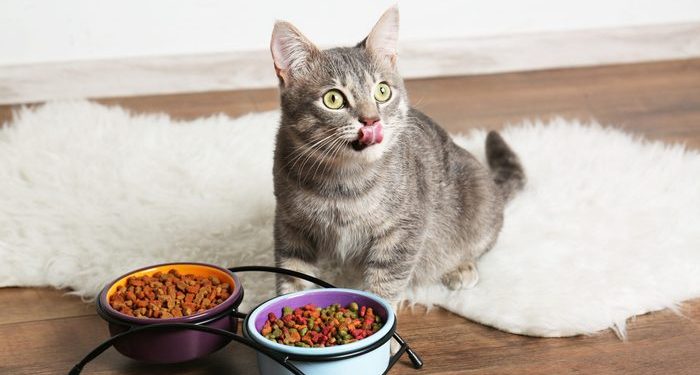Your cat will show you what to do during the meal when it is hungry, and many cats may need to be used. But cats are not as sensitive to food as dogs, so frequent starvation, begging, or crying over food between meals may point to another treatment issue. Understanding why and when cats starve can help you determine when to see your veterinarian and what to report.
Crying for food at mealtimes
Cats are smarter than you think, and if you feed them at the same time each day, they will know when it is time to eat.1 crying, crying, and staring at you until you put food in its container are like hungry cats. Great to do No, your cat is not starving, but it is probably hungry. Just like humans, an empty stomach sends signals to its brain that tells it to eat and if you are a regular human feeder, your cat will make sure you do not forget its food.
Calling to hold
If you keep your cat touching somewhere and they see you standing there, they may run and start crying for treatment. This is especially true if you pick up that bag or container and shake it. Cats have a good sense of humour and come running when they hear a familiar, happy sound, especially when they are hungry.
Stealing food at the table
Cats can easily jump on the counter or table and grab a piece of chicken or lick a butterfly. Once they get a taste of something good that is not in their food container, it will be a bad habit you will have a hard time breaking it. Cats are like other pets — and most people — who can’t avoid trying to catch them, so be sure to pack your food if you plan to leave unattended.
Cats who are very active and those who are getting poor nutrition during meals may be more likely to steal food from the table. Adding a Cat Diet or feeding a diet high in calories can help protect your cat from catching surfing if that is the case.
Eating fast
Cats that had to compete or fight for food have a higher chance of eating their food faster or crazy. Some cats even grumble or moan while eating and seem to swallow their food without chewing. This is common with cats with a history of stray, feral, or those that have come from large cat litter where meal time resulted in diet competitions when food is scarce.
You should visit this site: free sab result
Older cats or those who get into a fast food habit can relax and learn not to worry about the presence of their food. After getting a regular diet, most cats do not feel compelled to eat as fast as they can, unless they have a medical condition that makes them feel constantly insane.
Eating and vomiting
Vomiting is not uncommon to see cats in the house.2 they decorate themselves a lot so they often have a lot of hair in their digestive tract, which can form a hair follicle. If the cat is unable to pass the hairball in its dirt, then the hair comes out when your cat vomits or sticks to the stomach or intestines. When a ball of hair is put in your cat, it vomits up its food, because the food cannot digest it. If you suspect that your cat has a hairball or something stuck in their stomach, take your pet to a veterinarian. X-rays will show if your cat needs to be removed from a swallowed object or a hair ball. This removal is usually performed by surgery, but sometimes endoscopy can remove material from the inside of the oesophagus or abdomen.
Some cats vomit regularly after a meal and their diet is still adequate or complete. This act of vomiting freshly eaten food is called regurgitation and is common because the cat quickly ate it. Emotionally, rehab is easy to stop and calm your cat when it eats. Try spreading its food on a cookie sheet or putting large items to eat inside your cat’s food dish. You can buy special food bowls with a finger-like concept or nubs designed to make your cat work around and thus eat less.
Eating and weight gain
If your cat is crying for food and is gaining weight, then this is a sign to you that you should feed your cat a little, no matter what he is trying to tell you. Some cats, like other people, are just fond of food and if you over-feed them, they quickly increase in number and face thousands of treatments. Diabetes, joint issues, cancer, and other common occurrences in obese pets.3 most cats only need 1/4 to 1/2 cup dry cup per day but this may vary depending on your cat’s performance and how. The more calories the food your cat has.
Eating and weight loss
Cats that seem to be always hungry and overweight are often diagnosed with another disease. These include:
- Intestinal parasites: commonly known as worms, intestinal infections that eat from what the cat eats, stealing a large portion of the food from the food. This means that the cat can eat and still feel hungry because it is feeding on insects and getting very little food. Cats can get worms from eating fleas and from being outside, but medicines can remove your cat from it. To determine the type of insect infestation of your cat, you should have a thorough examination of its faeces by your veterinarian. Many monthly remedies for fleas and heartworm also contain intestinal parasite deworming medications but they do not protect your cat from all kinds of worms.
- Hyperthyroidism: cats with an overactive thyroid gland have hyperthyroidism and are prone to starvation.1 a simple blood test by a veterinarian can diagnose a cat with this disease. It can be treated with medication.














